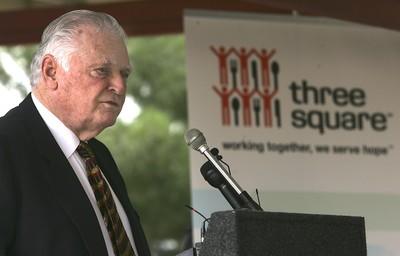Hilton heir announces effort to end hunger in LV Valley

If what was promised Tuesday actually transpires — a $40 million state-of-the-art food production and distribution system to end hunger in Las Vegas — then the needy can be thankful that Eric Hilton has an appetite for watching TV in bed.
Hilton, the wealthy 73-year-old son of the late Conrad N. Hilton, founder of the Hilton hotel chain, said Tuesday that he almost had nodded off three years ago when a late night TV news story caused him not only to awaken, but to sleep uneasily until morning.
A nonprofit agency that had been serving more than 300,000 meals a year to the poor was closing its doors because of financial problems, Hilton learned.
“It just didn’t seem right in Las Vegas, where so many people come to have a good time and money and food are plentiful, that people were going hungry,” said Hilton, a Las Vegas resident and businessman for more than two decades.
The next morning, he said, he called the Conrad N. Hilton Foundation, known for its humanitarian initiatives, with this message: “I want to end hunger in Las Vegas.”
That directive, which resulted in the foundation financing a $250,000 two-year study of hunger in Southern Nevada, spawned a news conference by Hilton and business and resort leaders Tuesday at The Center for Independent Living that revealed the formation of Three Square, an entity dedicated to eradicating hunger locally.
Within three years, Three Square — which includes support from MGM Mirage, Station Casinos, Boyd Gaming, The Harrah’s Foundation, and the Nevada Community Foundation — will try to more than double the 4 million meals served each year by 150 nonprofit agencies in the Las Vegas Valley, Hilton said.
“The study found that those 4 million meals were meeting less than half the demand,” said Julie Murray, chief executive officer of Three Square.
The food production and distribution system, which leans heavily on volunteer efforts of culinary experts from the gaming community, is to be housed on a 15- to 20-acre campus, a site for which has yet to be selected. There, meals will be made and then distributed daily in a kind of meals-on-wheels fashion to nonprofit agencies that feed the poor, Murray said.
“We need one efficient hub in the community where vendors can donate and food can be prepared,” Murray said, adding that people will not be fed at the campus. Land for the campus should be purchased by the end of June, she said.
As it stands now, Murray said, individual nonprofit agencies have to spend too much time trying to have food donated and prepared.
According to Murray, it may be necessary for nonprofit agencies to pay Three Square about $1 for a meal that includes meat, fruit and vegetables.
Murray said the study showed the need for a campus of about 250,000 square feet. It will also house a food bank and facilities for food recovery from hotel and restaurant entities. The estimated $40 million for the campus, Murray said, will be raised from “one on one asks, the gaming community, foundations and philanthropists — all the usual fund-raising techniques.”
Murray said the state Legislature has approved $1 million to be used on capital expenditures for Three Square.
Murray said chefs from major resorts in Las Vegas are now trying out food preparation concepts through five social agencies, including the Las Vegas Rescue Mission and Salvation Army.
Hilton said he originally thought much of the food to be used would come from leftovers at local hotels and resorts. But he said he learned that new preparation techniques result in little waste.
According to Murray, the gaming community’s knowledge from working with vendors should result in either large quantities of donated food or food sold at much lower prices.
Walter Coffey, director of restaurant design and development for Harrah’s Entertainment, said the Hilton foundation-commissioned study found that the demand for food is going to double in the next 10 years.
He said the needy are not just the homeless, but also seniors and children.
“The face of hunger is much different in reality than people think,” Coffey said.